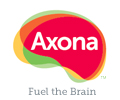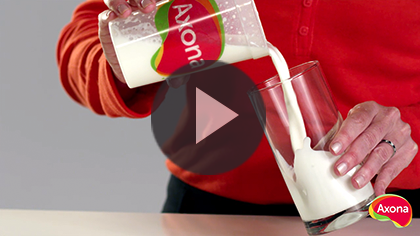Axona frequently asked questions
- What is Axona?
Axona is a prescription medical food containing a specific formulation of medium-chain triglycerides (MCTs), specifically caprylic triglyceride, for the clinical dietary management of the metabolic processes associated with mild to moderate Alzheimer’s disease.
- How does Axona work?
Brain cells normally use glucose, a type of sugar, to fuel daily activities. In Alzheimer’s disease, brain cells become less able to use glucose as fuel, leading to memory and thought impairments. Axona provides medium-chain triglycerides to the body that can be metabolized into ketone bodies, which may be utilized by the brain as an alternative source of fuel.
Learn more
- Does Axona require a prescription?
The use of Axona must be under medical supervision; therefore, it is only currently available by prescription. Axona is available at most retail pharmacies; however, if your pharmacy does not carry Axona, please call 1-877-649-0004.
- What is the main ingredient of Axona?
The main ingredient of Axona is caprylic triglyceride, a type of fatty acid found in coconut or palm kernel oil.
- Is Axona FDA approved?
While Axona is strictly regulated by the FDA, a prescription medical food does not go through the same approval process as a traditional drug product. Accera has conducted all of the necessary safety studies, and Axona has been developed, manufactured, and labeled in accordance with both the statutory and FDA regulatory definition of a medical food. In addition, Axona is subject to manufacturing facility inspections, including product and label reviews by the FDA.
- What is a medical food?
A medical food, such as Axona, is intended for the dietary management of a specific disease or condition. In the case of Axona, a distinctive nutritional requirement has been established through medical evaluation to help manage mild to moderate Alzheimer’s disease. Axona is intended for use under the supervision of a doctor.
Learn more
- Is Axona a drug or a dietary supplement?
Axona is a medical food product and not a drug or a dietary supplement. Medical foods are regulated by the FDA, but are in a unique category separate from drugs and dietary supplements.
Learn more
- How many calories are contained in Axona?
One 40 gram packet contains 217 calories.
- What is the nutritional content of Axona?
For product with an expiration date BEFORE January 25, 2014, the nutritional content for each 40 gram packet of Axona is: total calories (217), protein (6.8 g), carbohydrate (8 g),* caprylic triglyceride (20 g), vitamin A (3820 IU), vitamin B6 (1.36 mg), vitamin C (94 mg), vitamin E (16.68 IU), folic acid (0.37 mg), chromium (0.038 mg), zinc (3.89 mg), calcium (240 mg), potassium (255 mg), sodium (58 mg), phosphorus (363 mg), magnesium (116 mg).
For product with an expiration date ON or AFTER January 25, 2014, the nutritional content for each 40 gram packet of Axona is: total calories (217), protein (7 g), carbohydrate (8 g),* caprylic triglyceride (20 g), calcium (240 mg), potassium (255 mg), sodium (58 mg), phosphorus (363 mg), magnesium (116 mg).
*Total carbohydrates include 2.4 grams of sugar and a negligible amount of lactose.
- Is Axona effective?
In clinical studies, Axona has been shown to enhance memories and thoughts in certain people with mild to moderate Alzheimer’s disease.*
Learn more
- Is Axona safe?
The ingredients in Axona are Generally Recognized As Safe (GRAS) or have achieved self-affirmed GRAS status according to strict FDA standards. The requirements for an ingredient to achieve GRAS status require not only technical demonstration of nontoxicity and safety, but also general recognition and agreement on that safety by experts in the field.
- Are there any side effects?
Overall, Axona was well tolerated in clinical studies. The most common side effects were diarrhea, nausea, flatulence (gas), and stomach discomfort, which were generally considered mild to moderate. These side effects may be reduced if Axona is taken shortly after a meal.
Learn more
- What can be done to minimize side effects from Axona?
Each 40 gram dose of Axona contains 20 grams of medium-chain triglycerides (MCTs). Due to the rapid digestion of MCTs, some people may experience diarrhea, bloating, or stomach upset after taking Axona. Since it is difficult to determine in advance who might experience these side effects, please follow the instructions in the How to take Axona section of this website.
Over-the-counter medications such as simethicone (for gas), antacids (for heartburn), and antidiarrheals (for diarrhea) can be useful. People with persistent side effects should seek the advice of their doctor. If persistent side effects occur, discontinue Axona until symptoms resolve (generally within 2 to 3 days). Restart Axona at the previously tolerated dose.
- Who should not take Axona?
Axona is a prescription medical food intended for the clinical dietary management of the metabolic processes associated with mild to moderate Alzheimer’s disease. Axona should be used with caution in people who are at risk for ketoacidosis, for example, people with a history of alcohol abuse and poorly controlled diabetics; or those who have a history of inflammation of the gastrointestinal system, metabolic syndrome, and/or renal dysfunction. Axona contains caseinate and whey (dairy), and lecithin (soy). Contains: milk and soy.
As no formal studies among the following groups of people have been carried out, Axona is not recommended if you:
- Are under the age of 18
- Have a history of diabetes that is not well controlled
- Have a liver or kidney dysfunction
- Are pregnant or lactating
It is important to discuss your complete medical history with your doctor before taking Axona.
- Can I take Axona if I am allergic to milk or lactose intolerant?
Axona contains caseinate and whey, both of which are derived from milk. Axona should not be used by people who are allergic either to milk or to these component ingredients.
A single 40 gram dose of Axona contains less than 0.04 grams of lactose. As a comparison, one cup of cow’s milk (whole, 2%, or skim) contains about 10 to 14 grams of lactose. Therefore, Axona contains less than 1% of the amount of lactose contained in milk.
Thus far, Axona has not been studied in people who are lactose intolerant. Since the sensitivity to lactose can vary widely among people diagnosed with lactose intolerance, we recommend that people who are lactose intolerant consult with their doctors before taking Axona.
- Can I take Axona if I am allergic to soy products?
Each 40 gram packet of Axona contains 0.22 grams of lecithin derived from soybeans. Therefore, Axona should not be used in people with known allergies to either soy or soy lecithin. The majority of soy lecithin is purified from soybean oil that has been processed to eliminate most, if not all, allergenic proteins. Since trace amounts of soy proteins may still be present in Axona, we provide the cautionary statement on our package for people who are allergic to soy.
We recommend that this information be reviewed with your doctor. Your doctor should be able to make an informed decision, based on your medical history and known hypersensitivities, and determine if Axona might be appropriate for you.
- Is there any gluten in Axona?
Axona is gluten-free.
- Is Axona kosher?
Axona is certified kosher by the Orthodox Union.
- Can Axona be taken with other medications for Alzheimer’s disease?
Axona can be taken with commonly prescribed medications for Alzheimer’s disease, such as Aricept®, Namenda®, and Exelon®. No restrictions are required regarding dietary intake or the simultaneous use of nutritional supplements such as multivitamins and omega-3 products.
- How often should Axona be taken?
Axona should be taken as prescribed by your doctor. For most people, 40 grams (one packet of Axona powder) should be consumed once daily after a meal, preferably breakfast or lunch.
- Can Axona be mixed with something other than water?
In clinical studies, the current formulation of Axona was only studied when it was mixed with water. However, additional blending studies indicate that Axona is a highly stable product and may be mixed with other liquids and foods (such as juice, milk, a meal replacement drink, oatmeal, yogurt, pudding, or ice cream). In addition, mixing Axona with liquids and foods that contain additional fats and proteins may also reduce the likelihood of developing side effects such as nausea, indigestion, and diarrhea.
- Can an electric blender be used to mix Axona?
Yes, using an electric blender results in a uniform mixture that is similar to or better than using a shaker cup.
- Can you change your daily dose of Axona?
You should not change your daily dose without first consulting your doctor. Do not take more than one 40 gram packet of Axona per day unless instructed by your doctor.
- How far in advance can Axona be prepared?
In clinical studies, Axona was consumed immediately after mixing. If for some reason the Axona mixture cannot be consumed right away, it may be stored in the refrigerator for up to 24 hours. The Axona mixture should be shaken or blended thoroughly again before being consumed.


